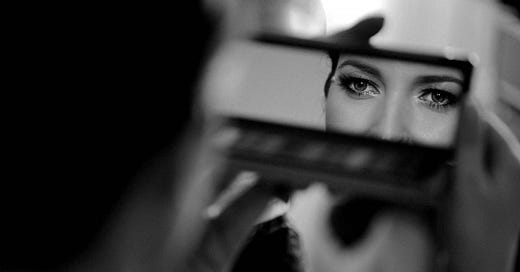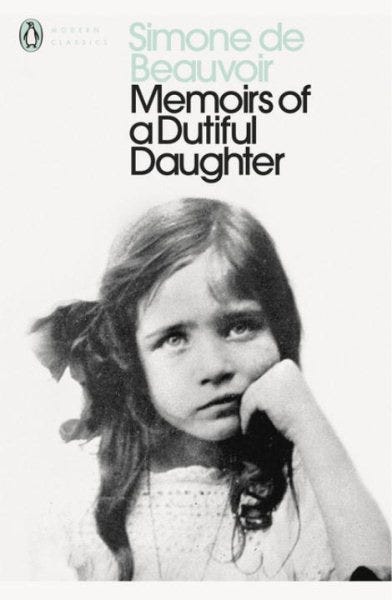Welcome to A Narrative of their Own, where I discuss the work of 20th century women writers and their relevance to contemporary culture.
I’ve been thinking a lot about impostor syndrome this week.
When you first put something out into the world, there's very little to lose. Nobody is expecting anything. It’s exciting, but there’s very little risk involved. The stakes are pretty low.
Once people begin reading your words - that’s great! It’s what you’re doing it all for. It gives you a real sense of achievement and encouragement that people are connecting with your words and ideas, and are interested in what you have to say.
But it can also become a little daunting. You can begin to question who am I to be writing this? And what do I know that people might be interested in?
I think some of these thoughts maybe occurred to me a couple of weeks ago when I received the Substack Recommended Reads. I have proudly displayed the badge on my ‘About’ page, and it felt like such an accomplishment to be chosen.
But then the doubts set in. Suddenly, a few hundred subscribers jumped to over a thousand. The nagging voices that plague all creatives began to chime in.
As I tend to do with all my questions around writing, I turned to the literary women I admire, to discover what they had to say about impostor syndrome.
“The impostor syndrome is a psychological term referring to a pattern of behavior where people doubt their accomplishments and have a persistent, often internalized fear of being exposed as a fraud.” Megan Dalla-Camina, Psychology Today
Writer, psychologist, and feminist thinker Simone de Beauvoir admitted to the emotion in her 1958 autobiography Memoirs of a Dutiful Daughter, recalling an experience of self-doubt which caused her to call into question her intellect.
“I was…suddenly uncertain of my true capacity,” Simone de Beauvoir, The Memoirs of a Dutiful Daughter
Not to be beaten down by this, however, Beauvoir went on to demonstrate within her work a better way to tackle these feelings of inferiority: by adapting to change.
Beauvoir speaks of her first meeting Sartre at the Sorbonne and realising after many hours of debate with him that she had some of her philosophical ideas around pluralist morality in a muddle. Rather than putting this down to her inferiority, however, Beauvoir says she chose to change the way she thought, stating that her curiosity to learn more was greater than her pride.
“I preferred learning to showing off.”
She did not wish to seek admiration for her ideas, in other words, but simply wished to get better at what she did. What mattered to her was striving to become a philosopher. Meeting so many other brilliant minds at the Sorbonne, she recognised that although she was no longer certain of her true capacity, she also had no reason to deny her competence, having gained entry at a top university and being one of only a handful of women to do so.
Beauvoir went on to become the youngest person ever to pass the aggrégation in philosophy, but on her first meeting of these other brilliant minds, she had made the realisation that she wasn’t the most exceptional person in the room. Far from making her feel a sense of lack though, she manages to see that there are other reasons for this, recognising that these men around her are more mature than her and have had an education which exceeded hers. She takes this additional information and decides to use it:
“I didn’t let myself be discouraged; the future seemed as if it would be much more difficult than I had reckoned but it had also become more real and more certain…Nothing had been done: but everything was possible.”
Beauvoir recognises that this will be a challenge, but commits to bringing about change within the society that she sees as stacked against her.
Beauvoir’s attitude to her sense of lack shows an interesting response to impostor syndrome. Rather than questioning her right to be amongst such esteemed peers, she embraced the knowledge that she still had much to learn, imagining herself as part of a collective project and seeing it as her duty to both change within it and change how others reacted towards her ideas.
A Guardian feature from 2016 tackled the issue of the lack of women in non-fiction book lists (which I have written about before). The article pointed out the lack of female representation in the area of non-fiction business books in particular.
When conducting research of women writers, the reasons cited for their lack of publication within the field included: questioning their legitimacy to write the book; the time away from domestic duties and childcare needed to write it (as well as that age-old favourite ‘guilt’); to the fear of upsetting someone, getting things wrong, or just plain failure.
Even bestselling writer and business advocate Sheryl Sandberg, in her book Lean In: Women, Work and the Will to Lead discusses the voice in her head that she claims many successful women share:
“Don’t flaunt your success, or even let people know about your success. If you do, people won’t like you.” Sheryl Sandberg
A quick google search revealed that some of the bestselling contemporary female writers claim to suffer from the syndrome, including Candice Carty-Williams and Colleen Hoover. The Irish novelist Marian Keyes recently claimed that she feels ‘apologetic’ when she attends literary festivals. Standing amongst the esteemed men of letters, she says she feels diminished by the feeling that she shouldn’t be there.
Although not exclusively affecting female creatives, gender seems to be a defining factor, at least amongst the ones admitting to the syndrome publicly. Perhaps for this reason, the condition was first identified by two female academics after speaking with their colleagues at Oberlin College, Ohio in the late 1970s. This led to the production of an academic paper which was then turned into the bestselling book The Impostor Phenomenon in 1985, by one of the authors of the original paper, Dr Pauline Rose Clance.
A recent study by Harvard Business Review of the original research, however, has found the ‘diagnosis’ of impostor syndrome to women problematic. They found that the 1970s research, for example, excluded other biases, such as racism, classism and xenophobia. Their suggestion, interestingly, was to create an environment in which all styles are respected and where there is a good mix of racial, ethnic and gender identities.
But much of this research is related to the business environment, rather than the creative one. And I think as many writers and creatives might recognise, what I am referencing here is not a deep-seated issue around inadequacy or low self-esteem, and for which professional help might be needed, but the creative impulse to question one’s ability to send work out into the world.
As this interesting article in The New European points out, anecdotally, when reaching out to both male and female authors, the writer found that overwhelmingly it was the female writers who confirmed they suffered from it, (though this could be a case of the male respondents not wishing to acknowledge that they suffered from it).
I do wonder if some of this has to do with the need many women feel to be ‘perfect’; to be productive workers, homemakers, mothers…the list can be endless, and can often result in women who become so terrified of making a ‘mistake’ that they choose not to create or put their work out at all.
This is particularly understandable when writing online in the era of social media and cancel culture.
Pulitzer Prize nominee and winner of five Grammy awards, a set of bestselling autobiographies, and many other accolades, Maya Angelou still referred to suffering from impostor syndrome.
“I have written 11 books but each time I think 'Uh-oh, they're going to find out now. I've run a game on everybody, and they're going to find me out’”.
Public recognition of her talent did not dent her own belief that at any moment, she was about to be ‘found out’ as a fraud who had no idea what she was doing.
This is interesting as the original research referred to in the 1970s and which Harvard has since questioned due to its lack of representation, saw the syndrome as predominantly affecting white women. However this myth has since been disputed, not least by authors such as Angelou and Carty-Williams, who also says she struggled with the idea that there were not many other writers around who resembled herself.
Author Francis Hardinge, winner of the 2015 Costa book award for The Lie Tree claims she faces this fear every time she begins a new book:
“...this is the book… where I disappoint everybody, and people see me for the fraud I am." Francis Hardinge
Unless we examine the societal pressures put upon women’s experience, as well as the racism within our society - not to mention classist prejudice - these feelings of inadequacy will be prevalent. Pre-existing stereotypes around who has the ‘right’ to work within a particular space will always lead certain groups to call their professional competence into question.
Expert in this area Dr Valerie Young advises that women are more likely to explain setbacks and failures as resulting from their lack of ability, while men are more prone to blame outside factors. I have experienced this idea personally, where I often find myself explaining away small successes with a shrug of I got lucky, but on the flip-side, very quickly apportioning myself blame to anything I see as a ‘failure’, whether this is artistic or otherwise.
But I’m not sure that this is an issue confined to women.
As I suggested before, perhaps the societal shift needs to be within the way we treat ‘success’ and ‘failure’, as well as our ideas around gender norms and expectations.
“Despite having written something close to 20 books, the feeling that I’m pulling off some kind of elaborate fraud has not diminished since the publication of my first.” Charlie Connelly in The New European
There has been a real push in recent years against ideas around masculinity - particularly of the toxic variety - as well as concerns over the way our lives are lived now within such a fast-paced, hyper-competitive society. We only have to consider the sheer numbers of excellent, talented writers on this platform. On a weekly basis, I try to read a broad-ish review of my favourite Substacks, as well as checking out ad-hoc pieces on ones recommended by others. What I see are writers putting themselves out there, reporting on interesting and relevant topics, as well as entertaining and informative pieces on all areas of art and literature.
I would like to place a bet that many of those writers will have hesitated before pressing publish; some will have wondered who gives me the right to speak about this. A number of them may have decided to delete the post altogether, the impostor syndrome getting the better of them.
Plus, it did occur to me whilst considering these ideas whether impostor syndrome is perhaps, at least in part, an indication of how much we care about what we do. Most writers can be pretty delicate when it comes to criticism. When a writer publishes any of their work, they therefore care deeply about how it is received, and that their readers appreciate the way they have tackled the subject. This feels like it is more in tune with Beauvoir’s ideas of realising that although we may not know everything, our desire to learn and to grow is bigger than our desire to be right; she ‘preferred learning to showing off’.
Even as I hope that more writers can overcome this feeling of inferiority, I know that it is like wishing for a unicorn for Christmas. Writers are artists of words; what we share can be personal, professional, researched, heartfelt. The best writing works on all these levels, and the surprising thing that I believe many of us forget is this: that although we may not consider ourselves an ‘expert’ in the piece we are writing, we are the only person who will convey the message in the way that we do.
And take heart if you are trying to create your own masterpiece: if Maya Angelou and Simone de Beauvoir still suffered with impostor syndrome, then who are we to question it?
If you have just found this newsletter and love discussions on all things literature, as well as connections to both contemporary culture and the art of writing, please consider a free or paid subscription. Paid subscriptions help me to continue to write and research quality newsletters every week - and the yearly fee works out at less than £2 per month! Thank you for reading 😀







I looooove this essay!! I’m writing this in my notebook: “She did not wish to seek admiration for her ideas, in other words, but simply wished to get better at what she did.” I resonate so much with this impulse and loved the example of de Beauvoir (who I often read and wonder how she could *ever* feel inadequate) experiencing these very human doubts and questions.
Such a great piece, Kate, and the literary references make it all the more tangible and poignant. I do think sometimes that questioning oneself is also simply a kind of awareness that we are all ephemeral and treading on thin lines. That realization that a lot of people won't like our work (even for de Beauvoir and Angelou) makes it all that more important to share it and to understand it as part of a dialogue of many views. However, at the same time, yes it's also a product of not feeling good enough perhaps because there's not enough positive feedback out there or even when there is, we question the rest of it because our imaginations of achievement are rarely accurate. Not sure, but I feel this, too! And think this idea of the juggle - especially but not only for women (& mothers) - can feel like a dangerous balance. We can spend so much time worrying where to place our time and energy that we become figuratively paralyzed.